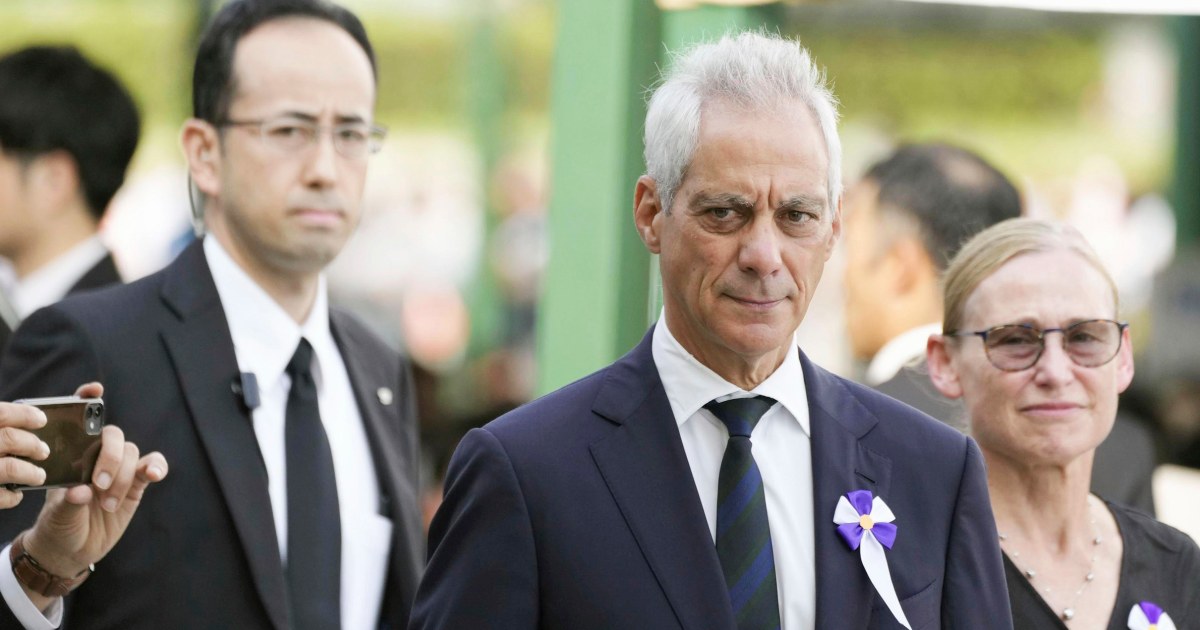TOKYO — U.S. and other Western ambassadors to Japan are skipping an atomic bombing peace memorial in Nagasaki on Friday after Israel was not invited over what the city’s mayor said were security concerns.
Diplomats from all over the world are invited to the annual ceremony, which commemorates the day the United States dropped an atomic bomb on the city. U.S. Ambassador Rahm Emanuel and other envoys say excluding Israel puts it on par with Russia and Belarus, which are the only two other countries not invited due to their military aggression against Ukraine.
The U.S. Embassy in Tokyo confirmed that Emanuel, who attended a similar ceremony Tuesday in the Japanese city of Hiroshima, would sit out the Nagasaki ceremony. Instead, he will attend a peace ceremony at the Zojoji temple in Tokyo and hold a moment of silence at the embassy.
“He has directed the consulates to do the same,” an embassy spokesperson said in an email.
The U.S. will be represented at the Nagasaki ceremony by the principal officer of the U.S. Consulate in Fukuoka, the spokesperson said.
British Ambassador Julia Longbottom is also skipping the ceremony, the British Embassy in Tokyo told NBC News, saying that not inviting Israel “creates an unfortunate and misleading equivalency with Russia and Belarus.”
Nagasaki Mayor Shiro Suzuki said Thursday that Israel had been excluded not for political reasons but out of consideration for survivors who might attend the ceremony. On Tuesday, activists protested the Hiroshima ceremony’s inclusion of Israel, which has come under international criticism over civilian deaths and destruction in the Gaza Strip as it wages war against Hamas after the militant group’s Oct. 7 terrorist attacks on Israel in which 1,200 people were killed.
Suzuki, whose parents both survived the Nagasaki bombing, said the survivors — known in Japanese as “hibakusha” — were now more than 85 years old on average, and that the ceremony on Friday “should not be affected by any kind of interference, nor should there be any obstructions.”
“The decision was made to ensure that the ceremony can be conducted smoothly in a peaceful and solemn atmosphere,” Suzuki said, adding that he had personally explained the situation to the ambassadors.
While Palestinian representatives were not invited to the ceremony in Hiroshima, where officials cited their lack of an internationally recognized state, they were invited to the Nagasaki ceremony.
Israel’s ambassador to Japan, Gilad Cohen, said in a post on X last week that the decision to exclude Israel from the Nagasaki ceremony was “regrettable” and “sends a wrong message to the world, and deflects from the core message that Nagasaki has been promoting for years.”
Cohen said there was “no comparison” between Israel and any other conflict.
Western diplomats first expressed their concern to Suzuki last month when he said Nagasaki was considering not inviting Israel.
“Not inviting Israel to the commemoration of the atomic bombing of Nagasaki city would result in placing Israel on the same level with countries such as Russia and Belarus, who are the only other countries not invited to the ceremony,” read a joint letter dated July 19 by envoys from the U.S., U.K., Germany, France, Italy, Canada and the European Union.
“Such an eventuality would be unfortunate and misleading,” the letter added.
The U.S. bombings of Nagasaki on Aug. 9, 1945, and Hiroshima three days earlier, led to Japan’s unconditional surrender and the end of World War II. An estimated 210,000 people were vaporized instantly or poisoned slowly and descendants of survivors have suffered from radiation-induced mutations.
For decades, both cities have held annual peace memorials, promoting a world free of nuclear weapons.
Suzuki said Thursday it was unfortunate that neither Israel, Russia nor Belarus would be at the Nagasaki ceremony.
“If we are talking about political reasons, such as because such and such is a party to a particular conflict, I personally believe that that is precisely the reason for inviting them to the ceremony: because they are a party to a conflict,” he said.
Arata Yamamoto reported from Tokyo, and Mithil Aggarwal reported from Hong Kong.

